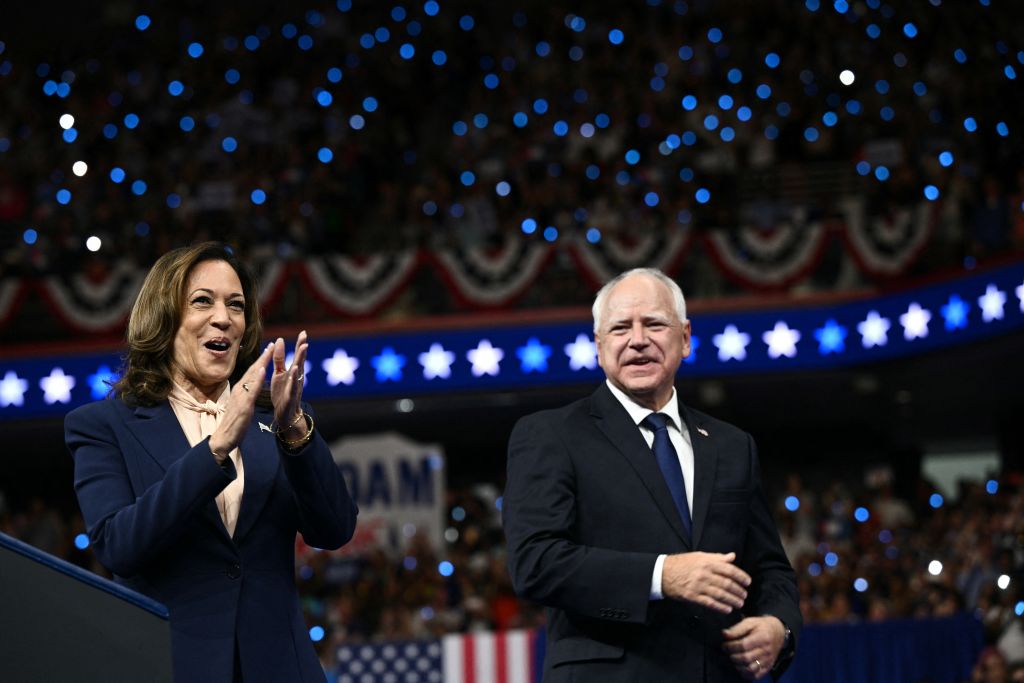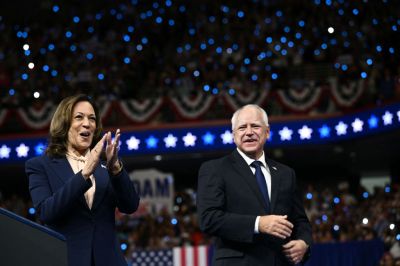Among the reasons that Kamala Harris’ 2020 bid for the presidency ended in tatters, two stand out.
One is that while she excelled in the choreographed set pieces of political theater, she struggled in extemporaneous moments. Hailed by many as an heir to the political legacy of Barack Obama, she lacked his skill for the “big interview,” in which he could manage to talk much but say little. She couldn’t do it. Harris was better on the debate stage, but she was certainly uneven.
A core skill in modern politics is to sit down for long interviews and have thoughts on a variety of topics, but to very seldom reveal a hard policy position. Donald Trump doesn’t do much in the way of real interviews these days, favoring friendly hosts who ask uncritical questions. One can see why. But at the beginning, Trump had a pitch man’s skill at telling audiences what they wanted to hear while also baffling them with nonsense.
Trump has lost the knack, but we don’t know how well Harris can handle this key bit of the presidential decathlon. She hasn’t done any interviews since she leapfrogged President Joe Biden more than two weeks ago and has answered exactly one question from reporters. She couldn’t do it four years ago, and some recent outings have been pretty dreadful, so the longer she waits to do it now, the higher the stakes become.
The other big reason Harris sank in the 2020 race was ideological, or more likely, strategic.
Like all human endeavors, the problem in politics isn’t that people don’t learn from past failures, it is that they learn the wrong lessons. And the Democratic Party of 2019 is a strong case in point.
With no Hillary Clinton, Democrats wouldn’t have felt the Bern. With no Jeb Bush, MAGA may never have had its moment.
Conventional wisdom at the time held that Hillary Clinton had struggled so terribly to defeat Sen. Bernie Sanders four years earlier for the same reasons the Republican establishment had been unable to stop Trump. Radical populism was having its moment and the Bernie bros were the left-wing version of Trump’s “deplorables.” So far, so good. But here’s where the wheels fall off. Democratic elites concluded that it was Sanders’ policy positions that won him his following and doomed Clinton to a six-month slog with a candidate who had started out as a sideshow.
The premise that Clinton was too moderate for her party and Sanders was in touch with the energetic voters in the Democratic base wasn’t wrong, per se, but it was very much incomplete. Sanders thrived and Trump won in part because of ideological reasons, but in both cases, the essential ingredient was their primary opponents.
Democrats did not want to have to nominate Bill Clinton’s wife, who had been waiting her turn since she had the nomination pried from her grasp in 2008, but she had bullied all the credible alternatives out of the race. Republicans did not want to coronate Jeb Bush, son and brother of former presidents, after having to accept establishment picks in two consecutive losing elections, particularly when the Bush of the moment was trying to clear the field for himself and refusing to show he was willing to hear their concerns.
With no Hillary Clinton, Democrats wouldn’t have felt the Bern. With no Jeb Bush, MAGA may never have had its moment.
In the aftermath of Clinton’s loss to Trump, Democrats rightly concluded that a key problem had been unenthusiastic support among their own party. The protest votes lodged for Green Party candidate Jill Stein were offered as evidence that it was Clinton’s moderation that cost her the presidency, when the real problem was a lack of enthusiasm for Clinton among Democrats of all stripes and the astounding arrogance of her campaign.
But by the time Democrats were getting ready to run in 2020, the idea that the radical left was driving the party was stipulated as fact. The successes of Rep. Alexandria Ocasio-Cortez and other democratic socialists in the 2018 midterms drove the point home: The Squad was like the Trump-y House Freedom Caucus, and socialism was to the left as nationalism was to the right.
So as Harris and the other aspirants to the 2020 presidential nomination were getting ready to run, they concluded that they wouldn’t meet the same fate Clinton had four years earlier, whether from Sanders or the new favorite of the far left, Sen. Elizabeth Warren.
They would embrace Sanders and his far-out policies, whatever the cost. Like Sen. Kirsten Gillibrand, Sen. Cory Booker, and South Bend, Indiana, Mayor Pete Butteigeig, Harris got behind “Medicare for All” for universal government health insurance. A bidding war broke out for progressive support, with Harris moving left on fracking, the Immigration and Customs Enforcement agency, increased police patrols, allowing felons to vote, and a mandatory buyback for some firearms.
Among major candidates, only Biden and Sen. Amy Klobuchar resisted Sandersism from the start, giving them a head start when Harris and the others tried to crawfish their way back to the middle of their party. Biden won and much of Sandersism was forgotten when the radical wave failed to materialize in the 2022 Democratic primaries. Even Ocasio-Cortez lost the love of the Democratic Socialists.
But old habits die hard.
There are a number of differences between the two finalists for Harris’ choice of a running mate: the man she selected, Minnesota Gov. Tim Walz, and the one whom she did not, Pennsylvania Gov. Josh Shapiro. Walz is older and has a more varied biography than Shapiro. Shapiro is from the most important swing state for Democrats, while Walz is from a reliably Democratic state. But on most matters, they seem fairly similar. Except for one: Shapiro, who is Jewish, was an outspoken critic of the antisemitism that emerged in the pro-Palestinian protests that rocked campuses and cities in the spring. He made himself an enemy of the anti-war left and won lots of strange new respect on the right.
So it became a matter of great importance to Sanders and other progressives that Harris chose Walz over Shapiro, and she gave them what they wanted.
Walz is certainly the safer pick. Unlike Trump’s selection of J.D. Vance, Walz appears to be a selection aimed at uniting Democrats. But snubbing the popular governor of such an important state is hardly without risk itself, especially when the decision sends a message to voters outside of your party that you may be beholden to ideological extremists. Walz is no Vance, but there is something of the same missed opportunity to attract new voters with the choice.
It is not likely that Waltz will matter much in the race, as he meets the first rule of running mate selection: Do no harm. A selection very much like Clinton’s choice of Sen. Tim Kaine in 2016.
But it gives us our first big data point about Harris’ willingness to play for the center of the electorate, and, most importantly, to give bad news to the left wing of her party. Maybe it will add up to a symbolic nod on a relatively minor matter and Harris will show independence in other ways, as she already has on key issues like fracking.
Whatever it is, though, it is not the pick of a confident campaign.






Please note that we at The Dispatch hold ourselves, our work, and our commenters to a higher standard than other places on the internet. We welcome comments that foster genuine debate or discussion—including comments critical of us or our work—but responses that include ad hominem attacks on fellow Dispatch members or are intended to stoke fear and anger may be moderated.
With your membership, you only have the ability to comment on The Morning Dispatch articles. Consider upgrading to join the conversation everywhere.